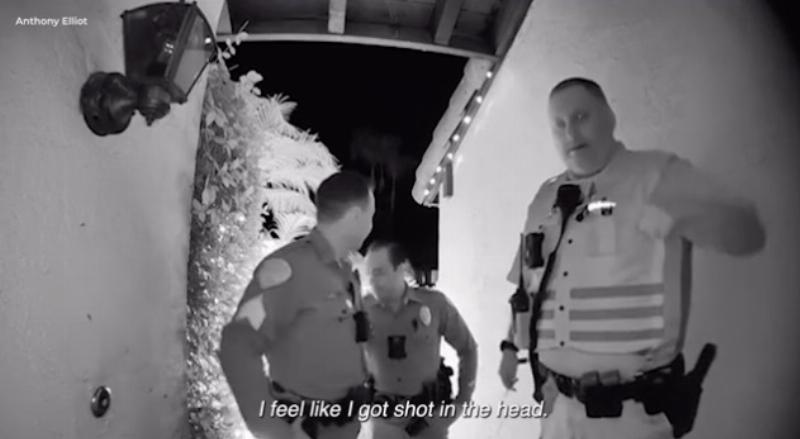


The headline at the Daily Mail said, “Eerie moment police officer spooks his colleagues as they arrive on his doorstep to tell his wife he was shot in the head.” Huh? Were they mistaken about his being shot, and he was home all the time? Was this a back-from-the-dead ghost story? Was it simply that the officer’s recorded voice was on the camera audio? I needed to know, and I’m glad I took the time to find out, because Anthony Elliott’s story is a wonderful reminder of how love will drive a husband and father.
At this point, you can stop reading and just head straight over to the Daily Mail. Or, you can bear with me as I summarize the story. Your choice.
Anthony Elliott is serves on the San Diego police force. He’s also a Navy vet, a SWAT team member, and a married father of two boys.
In December 2023, when his wife was home with their toddler and newborn, Elliott responded to a domestic call, which most police will tell you are the most dangerous calls. In this case, he was chasing a suspect when the suspect turned and shot him in the head.
The bullet went straight into Elliott’s brain, but not only did it not kill him, it didn’t render him unconscious. That’s why he was able to save himself from slamming headfirst into the pavement (which would have killed him) by grabbing onto something with the still-operative side of his body to break his fall.
As Elliott lay on the ground, he told his team members to make sure to convey the best possible news to his family:
‘Tell my kids daddy’s going to be okay,’ he told one of them. ‘Tell my wife I love her. I wanted them to know I tried.’
Once in the hospital, and still conscious despite the bullet in his brain, Elliott tried to call his wife, but she’d turned her phone off so that she could catch some sleep.
Elliott then started worrying about what his wife would go through if she opened her door to three police officers. She’d instantly think he was dead, which would be a horrible shock to her—and of course, the officers didn’t know anything about Elliott’s condition beyond the fact that he’d been shot in the head.
So, Elliott monitored the Ring app on his phone and, when the officers showed up, he told them how to handle the visit:
The rest of the story (which, again, I urge you to read in full) is devoted to discussing the incredibly hard work Elliott put into recovering and getting back on the job.
The story might have resonated with me as much as it did because I was just talking to a friend whose son suffered a serious concussion. All the medical advice was that he needed to rest his brain. For two years, this once healthy, active young man put his life on hold, barely graduating from college, unable to hold a job, abandoning his social life and physical activities, and living in a silent, dark room.
And then, his mother discovered Michael Collins at the University of Pittsburgh Medical Center. Collins has a different approach, and one that mirrors the hard work that Elliott did to recover from his severe brain trauma. According to Collins and those who share his views, in many (not all, but many) concussion cases, the brain needs to be worked hard back into functioning, not simply rendered inoperative in the hope that it will miraculously heal itself.
For my friend’s son, the Collins approach was miraculous. Within three months of pushing himself (not hiding from the light, not retreating to the room when his head pounded), his life was completely back to normal.
The brain is an amazingly elastic, plastic organ, and it can do truly wonderful things—especially when a spirit like Anthony Elliott is driving it.
Image: Daily Mail screen grab.
